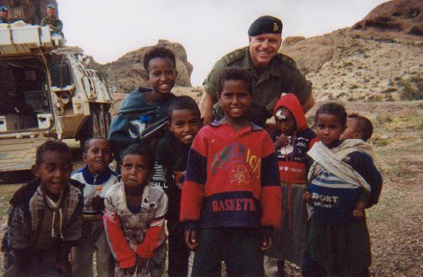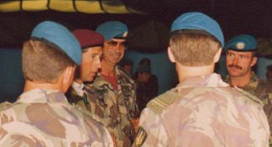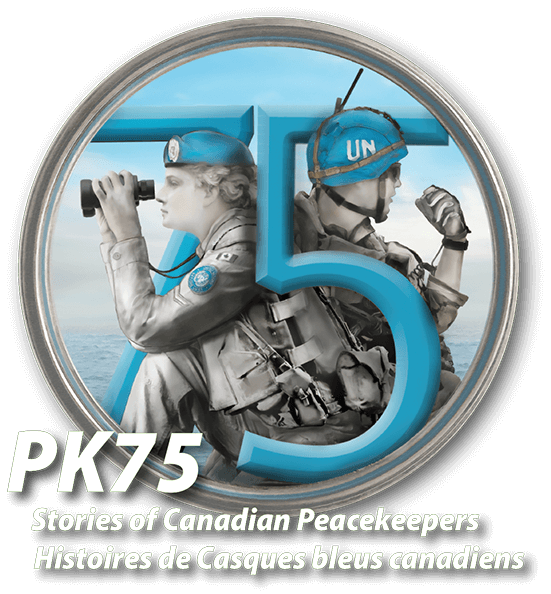


Peterborough, ON, Canada
Gregory B. Mitchell
Current Location: Kingston, ON, Canada
Having devoted many years to its study and practice, I am a steadfast believer in the intrinsic value of peacekeeping. When done well, it can secure peace and offer hope for people in war-torn areas of the world who would otherwise continue to suffer from violence and the horrible consequences that war inevitably creates - disease, famine, and displacement. Some of my most vivid recollections of peacekeeping involve individual conversations and encounters with local civilians, former combatants, and fellow peacekeepers. During my first of three tours in UNFICYP, Cyprus, only three years after the Turkish invasion that had cost the lives of two Canadian soldiers, I met an elderly Greek-Cypriot lady. Now forced to start her life over in Nicosia, she had forever been displaced from her home in Kyrenia, where now only Turkish-Cypriots were permitted. When accompanying a Canadian patrol deployed in UNMEE, we bypassed one of many uncleared and deadly minefields between the armies of Ethiopia and Eritrea, where the skeletal remains of young soldiers were left unidentified, and unclaimed. I could only imagine the pain and suffering of the families who would forever wonder what had happened to their beloved sons. In Sudan, while serving with UNMIS, we were negotiating between former combatants in the recently ended civil war, and I was shocked and saddened by the statements of their senior commanders. When questioned, they calmly declared that, after 20 years of fighting, they had no prisoners to release, a casual admission of the war crime of executing prisoners. Both sides also refused to acknowledge their use of children as soldiers, something we in the peacekeeping mission knew to be untrue.
While in Haiti, I was fortunate to see firsthand the good work being accomplished by MINUSTAH to help one of the world’s poorest nations. Unfortunately, many of my UN colleagues were later killed in a devastating earthquake that also claimed hundreds of thousands of Haitian lives. Two RCMP Officers and six Canadian civilians working with the UN were among the dead. In Bosnia, with Canadian soldiers of UNPROFOR, we visited a couple in their 80’s who had recently chosen to return to their small village, rather than remain safely with their extended family in Oakville, ON, where they had fled the war years before. With a Canadian-donated tarpaulin for a roof, no electricity or running water, a meagre garden for food, and no health, sanitation, or medical services to call upon. Yet, they seemed content, for this was their home where they had chosen to return to live out the rest of their days, despite the ravages of war so evident around them. I was worried about their vulnerability and the unlikelihood of their survival, but was also in awe of their faith, resilience, and determination, and was honoured to be entrusted by them with a letter I later delivered in person to their extended family in Canada.
Over the years, finding common ground and mutual respect between us, I developed many friendships with devoted international humanitarians, police, and diplomats, and with other military peacekeepers from around the globe. I also occasionally bonded with soldiers who were former combatants whom we were there to separate and with whom we nurtured and enforced ceasefire agreements. However, the very best memories I have are of those fine Canadian men and women, military, police, and civilians, with whom I deployed in far-off lands. In the service of peace, we worked together, sacrificed together, broke bread together, and shared the bonds of comradeship that come from overcoming challenges, living in austere and dangerous environments, and bringing some semblance of peace to a previously war-torn corner of the world. In our own way, one positive way, we willingly gave of ourselves, selflessly and often with tremendous personal sacrifice, for the benefit of others who are less fortunate. We in Canada are indeed blessed not to experience war within our own country; yet, in this world we Canadians are in the minority. That is why peacekeeping is so important, and why I am its steadfast supporter.
Biography
The son of an honourable and dedicated Father who was a WW II RCAF aircrew Veteran, and an amazing Mother who, together raised five children, Greg Mitchell was raised in Peterborough, ON, where he attended Highland Heights Elementary and Adam Scott Collegiate and Vocational School. He was a member of the local Boy Scout Troop, 534 Air Cadet Squadron, and the Air Force Reserve. He and his wife currently reside in Kingston, ON. Together, they have three grown sons, two of whom are serving in the Army.
A graduate of the Royal Military College of Canada, Greg earned a Bachelor of Arts in English Literature, and was the Cadet Wing Commander, winning academic and military prizes, including the prestigious Sword of Honour. After a brief and unsuccessful stint as a student pilot, he became an Infantry Officer who eventually served three tours of duty with 2nd Battalion, The Royal Canadian Regiment (2RCR) within 5e Groupe-brigade mécanisé du Canada, and two with the Canadian Airborne Regiment, a unit of the Special Service Force. As Commanding Officer of 2RCR, he commanded a 1200-person Battle Group during the Oka Crisis
Greg served in senior staff positions at the Combat Training Centre, Land Force Central Area, and Army HQ. He was the founder and first Commandant of the Army’s Tactics School, and Base Commander of Canadian Forces Base Petawawa. As Commander of Land Force Atlantic Area, he was responsible for preparing the military response in the four Atlantic Provinces for Y2K and led the military support effort in Atlantic Canada on 9/11 when 24,000 passengers and crew, originally destined for the USA, were diverted to land in Eastern Canada.
As well as being a graduate of Canadian Forces Staff School, Army Staff College, Canadian Forces Command and Staff College, and Canada’s National Defence College, he earned a Master of Public Administration degree from Queen’s University and a Master of Public Safety degree from Wilfrid Laurier University. Additional peacekeeping studies were pursued in Italy, Sweden, Kenya, and the USA. Greg served on three United Nations (UN) peacekeeping tours in Cyprus as Contingent Welfare Officer, Company Commander, and Deputy Contingent Commander. He also had occasion to visit Canadian troops deployed to UN missions in Ethiopia-Eritrea, Lebanon, Haiti, and Bosnia, as well as the African Union (AU) Mission in Darfur.
Greg’s final military posting was in Denmark where he was the only Canadian ever to command the Multinational Stand-by High Readiness Brigade for United Nations Operations (SHIRBRIG). He served as a UN Military Advisor to the Sudanese ceasefire negotiations ending the 20-year civil war, helped the UN to plan and establish its political and peacekeeping missions in Sudan, leading deployment of SHIRBRIG’s HQ and serving both missions as, respectively, the first Military Advisor, and the first Deputy Force Commander. At the time, the UN’s integrated North-South Sudan mission was the largest, most complex, and most expensive in the history of UN peacekeeping, comprising 10,000 military troops from 25 nations, an annual budget of one billion U.S. dollars, and covering an area the size of Western Europe. While there, Greg also participated in training and planning for the hybrid UN-AU mission in Darfur.
After retirement, Greg moved with his family from Copenhagen, Denmark to Scottsdale, Arizona and obtained his Permanent Residency (Green Card) to continue his work as an expert in military peacekeeping, initially in New York on behalf of the United Nations, Department of Peacekeeping Operations, where he led development of a guide on how to start up new peacekeeping missions. Later, he was Director of the Honourable Roméo Dallaire’s Child Soldiers Initiative, dedicated to the eradication of the use of children as soldiers. He was then employed by the Pearson Peacekeeping Centre in Ottawa as Director of Exercises and Simulations. Partnering with Foreign Affairs and the European Union (EURORECAMP), he worked primarily in Ethiopia with the African Union’s Peacekeeping Standby Force, providing operational-level training exercises for senior diplomats, military, police, and humanitarians.
For a period of eight years, Greg instructed on the Canadian Forces College Joint Command and Staff Program on subjects ranging from ethics and leadership to peacekeeping and counterterrorism. He was also Executive Director of the Royal Military Colleges Club of Canada, serving the alumni of three Military Colleges. Currently, Greg is Executive Director of a company he founded, Peace Operations Consulting, as well as Special Advisor on Peacekeeping to the Canadian Peacekeeping Veterans Association, on whose behalf he is helping to create this anthology of Canadian peacekeeping experiences.

Greg with Eritrean children, 2001.

Greg (far right) meeting with Prince Charles (now King Charles III), in Nicosia, Cyprus, 1986.


